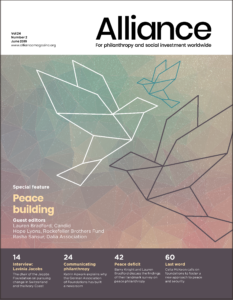The Alliance special feature on peace philanthropy is so timely and relevant.
After the collapse of the Soviet Union that marked the end of the Cold War, many experts were full of hope and expectations. They thought the world was heading towards lasting peace.
However, the reality proved to be more complicated and unsettling. Today the world we live in looks less stable and rarely predictable. Conflicts erupt all over the world, and state expenditure on the military is still excessive. According to the Italian Institute for International Political Studies (ISPI) in 2018, the world’s military expenditures exceeded 1.8 trillion dollars. When you see such huge numbers, you do ask yourself ‘Is peace-building a priority for us?’
Today peace-building is jeopardized and criticised because of the lack of visible results in resolving existing conflicts and this creates a fertile ground for criticism about its efficiency.
But, how do we assess peace?
If in physics darkness is the absence of light, then maybe peace is the absence of war? Peace is not a stand-alone event, peace is a permanent process of attentive listening, of creating mutual respect, of continuing education, and it requests constant efforts and the availability of resources.
Since 2013 Fondation Assistance Internationale (FAI) has been supporting Rondine Cittadella della Pace. The interaction work is based on empowering youth to become peace leaders and igniting these young leaders to keep taking action and use their capabilities in national and international settings, and advocating world leaders to be more accountable.
Rondine is a peace-building organisation based in the heart of Tuscany that for more than 20 years has been hosting young people coming from conflict or post-conflict areas and then training them to become future peace leaders. Rondine empowers youth who experienced the consequences of conflicts, to provide them with a platform to address the world, to speak and interact with decision-makers, and to call upon them to support Peace. When it comes to the question of impact and tangible results that many are demanding from peace-building, Rondine could be mentioned as a example of sustained peace-buidling with long term impacts.
Alumni of Rondine with the assistance of FAI turned their experience into the creation of the NGO ‘Rondine International Peace Lab’ (R-IPL). R-IPL jumped into action through its first project in Sierra Leone: the Initiative for Democratic and Peaceful Elections in Sierra Leone which had a strong and positive impact on decreasing the level of violence during presidential elections and sow the seeds of a peaceful future. a Rondine alumna, Maria Karapetyan, played a distinguished role during the non-violent revolution in Armenia and since April 2018 has served as a member of Parliament.
In December 2018, Rondine launched Leaders for Peace campaign from the United Nations headquarters in New York, asking each Member State to take a symbolic sum from the State Defense budget and direct it for the training of future leaders in conflict resolution. The campaign objective is the gradual extinction of war contexts from the planet, through the affirmation of a new culture that unmasks the false concept of the enemy and integrating human rights in national education systems.
Looking at the future, if we aim to create a peaceful environment, philanthropy could play a vital role by supporting organisations like Rondine, by conceiving and promoting grants strategies with core funds that support a wider vision as well as a project-based approach. FAI’s vision sees philanthropy supporting peace-building with a long term approaches, committed to networking, to dialogue, to respect the person’s rhythms; this way together we believe that a more peaceful world is possible.
Stefania Mancini is vice chair of Fondation Assistance Internationale
 Peace-related philanthropy, at less than 1 per cent of all grantmaking, seems irresponsibly small given that armed conflict spoils lives, divides societies and ruins economies.
Peace-related philanthropy, at less than 1 per cent of all grantmaking, seems irresponsibly small given that armed conflict spoils lives, divides societies and ruins economies.
Our new issue goes in search of philanthropy’s role in peaceful development.






Comments (0)